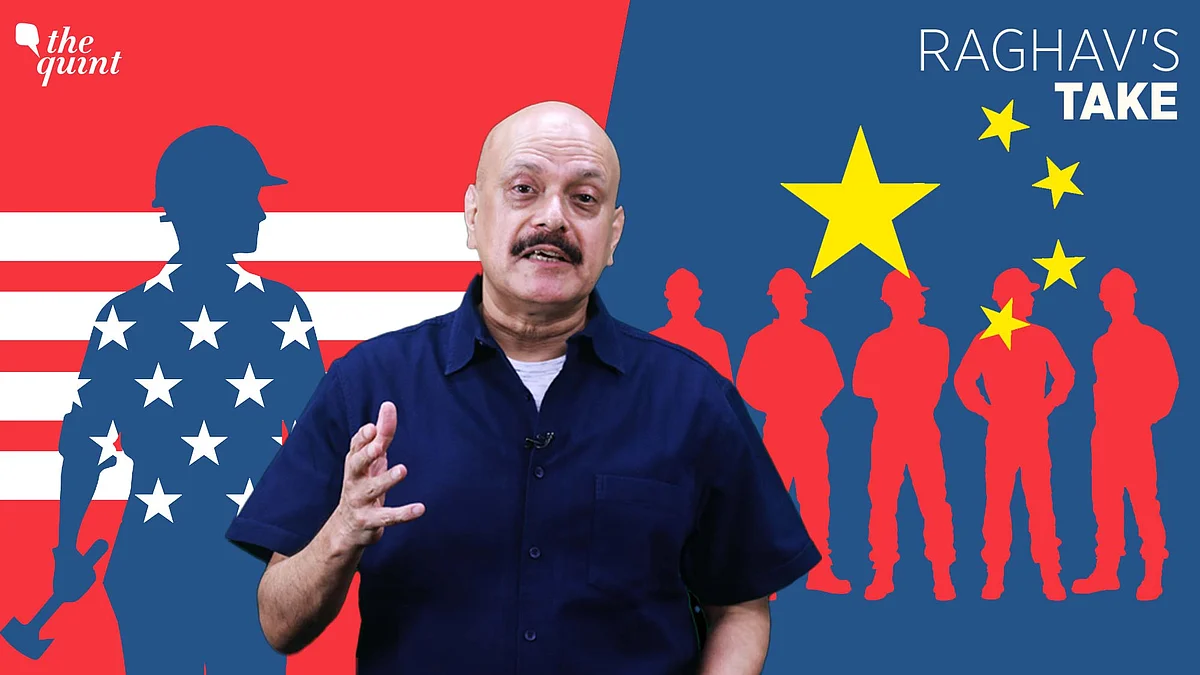America Can Copy China’s Policies, But Americans Can Never Clone Chinese Workers
America must stick with competitive and free market capitalism, writes Raghav Bahl.

advertisement
There’s a wonderful joke about economists—if there are five in a room, there will be six opinions!
But there's a rare unanimity among economists in assessing Donald Trump’s punitive tariffs. Almost every prominent thinker – from Larry Summers to Joe Stiglitz, Fareed Zakaria, Eswar Prasad and a ton of others – believes these will be inflationary and hurt America; perhaps also help China step into the vacuum and become a stronger economy.
While I am a simple hack (nowhere near a globally acclaimed economist), I wrote about this phenomenon within the first few days of Trump’s turbulent second term, how MAGA stands for Make America Go Alone; how a subterranean, quiet coalition of China, India, Europe—especially the UK, France, and Germany—along with Japan, Saudi Arabia, Canada, Mexico, Brazil and a few other significant economies could “push back” against America’s hegemony.
If this were to happen – and hard evidence is already apparent – it could force Europe to reclaim slivers of an earlier dynamism and Make China Great Again.
Has China Already Remade the International System?
Within this emerging context, a fascinating thesis was put forward by Michael Froman's China Has Already Remade the International System (Foreign Affairs, 25 March 2025). Froman asserts that instead of re-moulding China into a quasi-western style, free market, semi-democratic society (which was America’s strategic ambition ever since Richard Nixon and Henry Kissinger embraced an isolated communist country in 1972), it’s China that has remade America!
According to Froman, the first two decades of China’s economic liberalisation – anchored by the redoubtable Deng Xiao Ping and carried forward by President Jiang Zemin and Premier Zhu Rongji – were broadly consonant with what’s called the 'Washington Consensus'.
But then China took a rebellious turn, first under President Hu Jintao, who gave huge subsidies to “national champions” in strategic sectors, and more remarkably in President Xi Jinping’s continuing 13-year term which has converted China into a beacon of state-capitalism. Powered by the government, China has created overwhelming capacities, from two-thirds of global car production to over half of the world’s steel, aluminium, and ships. It has used questionable intellectual property rules to compete with America in cutting-edge tech, including artificial intelligence.
Froman concludes:
But why am I being nagged by the thought that something powerful has been left unsaid or ignored? That while the arguments are logical, a critical strand is missing.
It’s the Chinese Worker, Stupid!
Aah, I get it! Amongst global economists, there is a singular, tunnel-like focus on comparing America and China on two coordinates, viz economic policies and impact of capital/tech investments. Even Froman’s argument is that America is being forced to become like China on these parameters.
But a highly critical, vital third dimension is woefully absent, viz the contribution of China’s awe-inspiring manpower – whether hi-tech professionals or shopfloor workers – in creating the “miracle economy”.
Chinese and American workers, across categories, are radically different. Period. The Chinese work ethic is rooted in Confucian values. The concepts of Xiao (filial piety), Li (ritual and discipline), Ren (moral integrity), and Zhong (loyalty to authority and hierarchy) imbue the Chinese citizen with unquestioning respect, devotion, and commitment towards family, society, workplace, and the state.
Against this, barely 24 percent of Americans had confidence in Uncle Sam, per a 2021 survey; about 70 percent were convinced that individual rights outweigh any collective societal goal; and while 75 percent were proud Americans, it’s not a monolithic sentiment, yo-yoing with polarising politics.
Americans are also highly individualistic—while driving hard at work, they give equal importance to personal time and leisure. About 60 percent say they would prefer a healthy work-life balance to a maniacal focus on achieving success. In a sharp, almost inhuman, contrast, most Chinese workers swear by the 9-9-6 work ethic, i.e., work from 9 am to 9 pm, six days a week.
Over 90 percent were convinced that the economy would continue to grow with better living standards. Against this, barely 55 percent of Americans were optimistic, weighed down by unequal incomes and disruptions. While 80 percent of Chinese were satisfied with their personal economic condition, only 60 percent Americans felt the same.
China’s propaganda apparatus has also relentlessly proselytised the notion of an “ideal worker”. The legends of Zhu Yuanzhang (1328-1398), the founder of the Ming Dynasty, and Lei Feng (1940-1962), the ultra-patriotic soldier whose diaries immortalised the credo of “serve the people”, have been assiduously drilled into citizens’ consciousness. Both were poor orphans who lived and died for the nation. As against this, America has created no similar icons. Neither George Washington nor Abe Lincoln is venerated by citizens.
Clearly, from the above arguments, it’s impossible (and undesirable) for Americans – either professionals or shopfloor personnel – to match the dogged, almost robotic, work ethic and unquestioning loyalty of the Chinese.
America must stick with competitive and free market capitalism. Its individualistic workers and entrepreneurs thrive in that. They will get stifled – and rebel against – any attempt to become like China.